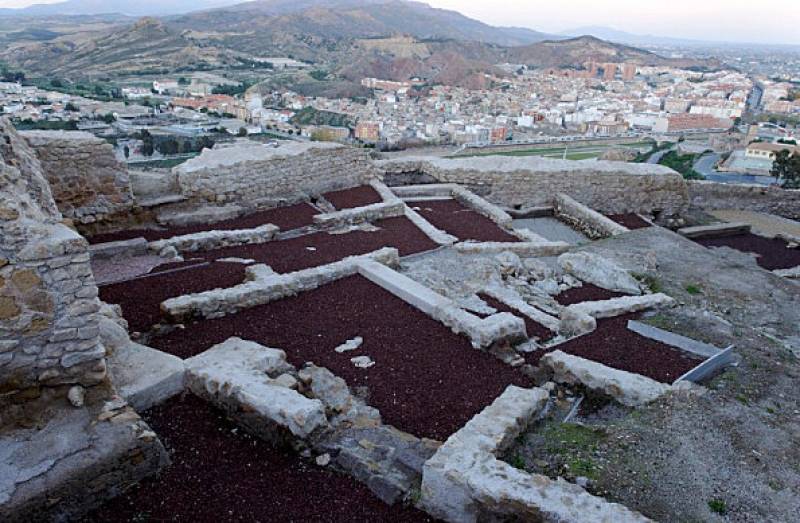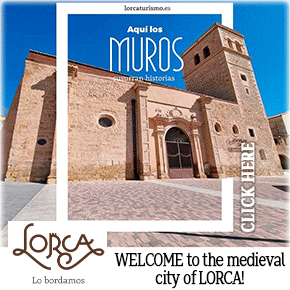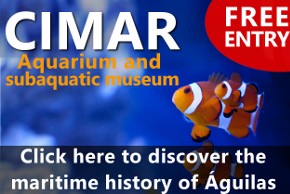September 23 Guided tour of fun and games in the Sephardic Jewish quarter of Lorca castle
How did children play in the Jewish quarter of Lorca in the 13th and 14th centuries?
 Various guided visits and tours are being held during September 2023 in Lorca to coincide with the annual celebration of Jewish cultural heritage throughout Europe, a tradition which the “City of the Sun” has been keen to embrace as it celebrates the importance of the Sephardic Jews in its medieval history.
Various guided visits and tours are being held during September 2023 in Lorca to coincide with the annual celebration of Jewish cultural heritage throughout Europe, a tradition which the “City of the Sun” has been keen to embrace as it celebrates the importance of the Sephardic Jews in its medieval history.
In fact the medieval synagogue and Jewish quarter which were discovered during excavations close to the castle in 2003 are among the most important Jewish remnants dating from the Early Middle Ages in the whole of Spain, a sign that the Sephardic Jews coinhabited peacefully with North Africans and Christians in Lorca until both the Moors and the Jews were officially expelled from the country by the Catholic Monarchs in 1492 (and four years later from Portugal, on the orders of King Manuel I.
One of the guided tours is a family event entitled “Jugando en Sefarad” in which visitors receive information about how the residents of the Jewish quarter in the 13th and 14th centuries enjoyed themselves, with a particular focus on children’s games. The visit begins at 18.30 and participants are asked to arrive at Lorca castle at least 20 minutes beforehand.
Prior registration is required online here and is priced at 10.50 euros for over 16s and 8.50 euros for those aged 5 to 16 (free for under-5s).
Further information is available from Lorca Taller del Tiempo (Convento de la Merced, Puerta de San Ginés, telephone 968 479003 / 968 959646, email info@lorcatallerdeltiempo.com).
For more local events, news and visiting information go to the home page of Lorca Today.
Oficina de Turismo de Lorca

The rich and extensive history of Lorca has left a legacy of archaeological sites, and historic buildings, around which the modern city has built its tourism industry. Among these are Lorca Castle, the Jewish quarter of the castle and synagogue, Plaza de España, Colegiata de San Patricio, Museo de Arqueologico Municipal, Iglesia de San Francisco, Casa Huerto Ruano, Palacio de Guevara, Iglesia de San Mateo, Pósito de los Panaderos, Convento Virgen de las Huertas, Antiguo Convento de la Merced, Iglesia del Carmen and the Teatro Guerra.
 Unfortunately Lorca has also been prone to natural disaster, suffering a Gota Fría on September 28th 2012, as well as two earthquakes measuring 5.3 and 5.5 on the Richter scale on 11th May 2011, claiming 9 lives. Since this earthquake the city has been rebuilding, winning recognition for its Lorca, Open for Restoration initiative, which used the restoration of the city as a tourist attraction whilst it rebuilt its historical buildings, some of which are currently still not open.
Unfortunately Lorca has also been prone to natural disaster, suffering a Gota Fría on September 28th 2012, as well as two earthquakes measuring 5.3 and 5.5 on the Richter scale on 11th May 2011, claiming 9 lives. Since this earthquake the city has been rebuilding, winning recognition for its Lorca, Open for Restoration initiative, which used the restoration of the city as a tourist attraction whilst it rebuilt its historical buildings, some of which are currently still not open.
The tourist office relocated for 14 years to Calle San Patricio, near the church, but has now returned to its former premises alongside the Palacio de Guevara in the Plaza Concha Sandoval, or Plaza de la Bordadora (click for map).
Lorca also has an area of coastline incorporating the Parque Regional de Cabo Cope - Puntas de Calnegre, in the Sierra de Almenara, which includes the beaches of Puntas de Calnegre, Baño de las Mujeres, San Pedro, El Siscal, Cala Honda, Cuartel del Ciscar, Junquera, Cala de la Gruta, Cala Leña, Los Hierros, Cala Blanca and Playa Larga, although many are accessible only along difficult tracks or by boat!

However, in spite of its many attractions, the name of Lorca is synonymous with Easter, (Semana Santa) its biblical parades of International Tourist Interest status and famous throughout Spain. The week includes a series of processions in which the Whites (Paso Blanco) and Blues (Paso Azúl) try to outdo each other with the magnificence of their embroideries and the skill and daring of their horsemen.
Lorca also has a Parador hotel, located within the historic castle.
Opening hours for Lorca tourist office:
Every day of the year apart from 1st and 6th January and 25th December, 10.00 to 14.00 and 16.30 to 18.30 (except Sunday afternoons).
These opening times are often extended and other information points created during the Semana Santa celebrations.
For more local news, events and visiting information go to the home page of Lorca Today




































